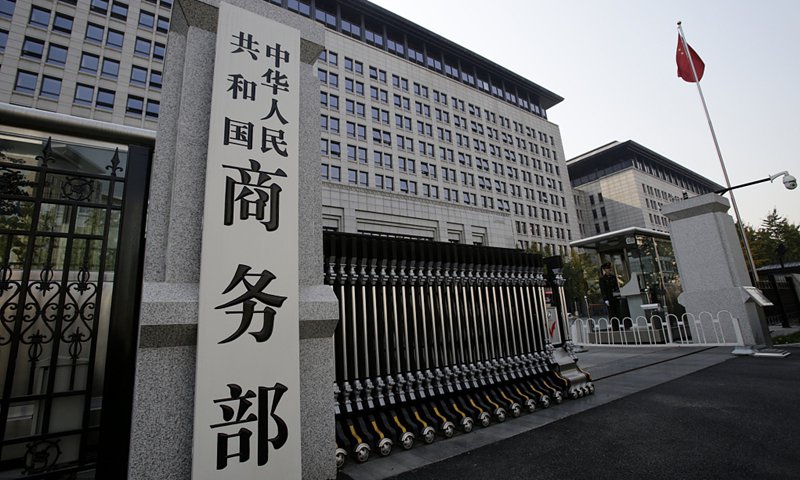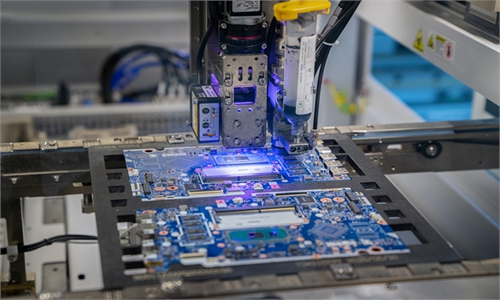US crackdown on Chinese companies is economic bullying, violates intl trade rules: MOFCOM spokesperson

China's Ministry of Commerce
China urges the US not to take the wrong approach and says it will take the necessary measures as appropriate to safeguard the legitimate rights and interests of Chinese enterprises, Chinese Ministry of Commerce (MOFCOM) spokesperson He Yadong said at a regular press conference on Thursday, reiterating China's clear and firm stance regarding intensified US moves targeting Chinese companies.
Chinese experts said that the intensified US efforts to curb Chinese companies and Chinese industry from technological innovation have so far proved a failure, as technology advancement for self-reliance is underway. Meanwhile, the US moves will once again backfire on US companies, experts said.
The remarks come as the Biden administration is reportedly considering blacklisting a number of Chinese semiconductor firms linked to Huawei Technologies Co, after the telecom company notched a significant technological breakthrough last year, Bloomberg reported, citing people familiar with the matter.
The companies that could be blacklisted include chipmakers Qingdao Si'En, SwaySure and Shenzhen Pensun Technology Co, it said.
In responding to the reported moves, the MOFCOM spokesperson said that China has consistently opposed politicizing and weaponizing economic, trade, and technological issues.
In recent years, the US has abused export control measures and unjustly sanctioned and suppressed Chinese companies, seriously disrupting global industrial and supply chains, harming others and itself, He said.
If the US, using the excuse of alleged affiliations, extends its sanctions beyond Huawei and targets more Chinese enterprises, it would be a typical act of economic bullying, violating international economic and trade rules, undermining the international economic and trade order, and earning the disdain of the international economic and trade community, He said.
Following Huawei's release of its Mate 60 Pro smartphone last year, which is powered by advanced Kirin chips, radical anti-China lawmakers in the US Congress have repeatedly called for further restrictions.
The Biden administration's relentless attempts to crack down on China's high-tech industry have failed to curb Chinese companies' technology development. Instead, they have only pushed for independent research, domestic substitution and self-reliance, Chinese experts said.
The Biden administration has inherited some of former US president Donald Trump's stance on China while developing a "small yard, high fence" approach targeting China, Ma Jihua, a veteran telecom observer, told the Global Times on Thursday. However, such measures have not truly achieved the expected goal of halting Chinese companies from achieving technological development, said Ma.
The self-sufficiency rate of Chinese chips has significantly increased from 5 percent in 2018 to more than 25 percent in 2023, which largely represents the lost market share of US companies in China, with Chinese experts saying that such a trend will continue, as the Chinese chip self-sufficiency rate increases further.
China's AI sector is undergoing a development boom, with the scale of the core industry at 500 billion yuan ($69 billion) and the number of AI enterprises exceeding 4,300, according to media reports.
The cards that the US has played in clamping down on Chinese companies have already been laid on the table, and the facts show that the measures the US has used against Chinese companies have backfired on US companies and consumers instead, Ma said.
According to Nvidia's fiscal results released on February 21, the US company recorded sales of $1.9 billion in the China market in the fiscal fourth quarter, which ended on January 28, Reuters reported.
That amounted to about 9 percent of total sales, down from 22 percent in the previous quarter.
By sanctioning Chinese companies, the US may have to come up with an alternative supply chain. But that could take time, as the Chinese supply chain and industry chain have matured and become complete and cost-effective, Xiang Ligang, director-general of the Beijing-based Information Consumption Alliance, told the Global Times on Thursday.
Although the US sanctions have caused some disruptions for Chinese companies, they have also served as a catalyst for companies to make breakthroughs in the innovation and production of core technologies, and it is only a matter of time for them to make further gains where they lagged behind, Xiang said.
In another attempt to decouple from China, the Biden administration is reportedly planning to provide billions of dollars for subsidies of chip producers including Intel, Samsung and TSMC, in order to help them expand their production in the US, according to media reports.
In responding to a media question regarding the report, the MOFCOM spokesperson said that the semiconductor industry is highly globalized, and after decades of development, it has formed an interconnected industry structure where each part relies on others, driven by factors such as resource endowments and market laws.
The US provides huge subsidies and tax incentives to its domestic chip industry, some of which coerce companies to abandon China in favor of the US, showing clear discrimination and severely violating market laws and international economic and trade rules, which will distort the global semiconductor industry chain, He said.



